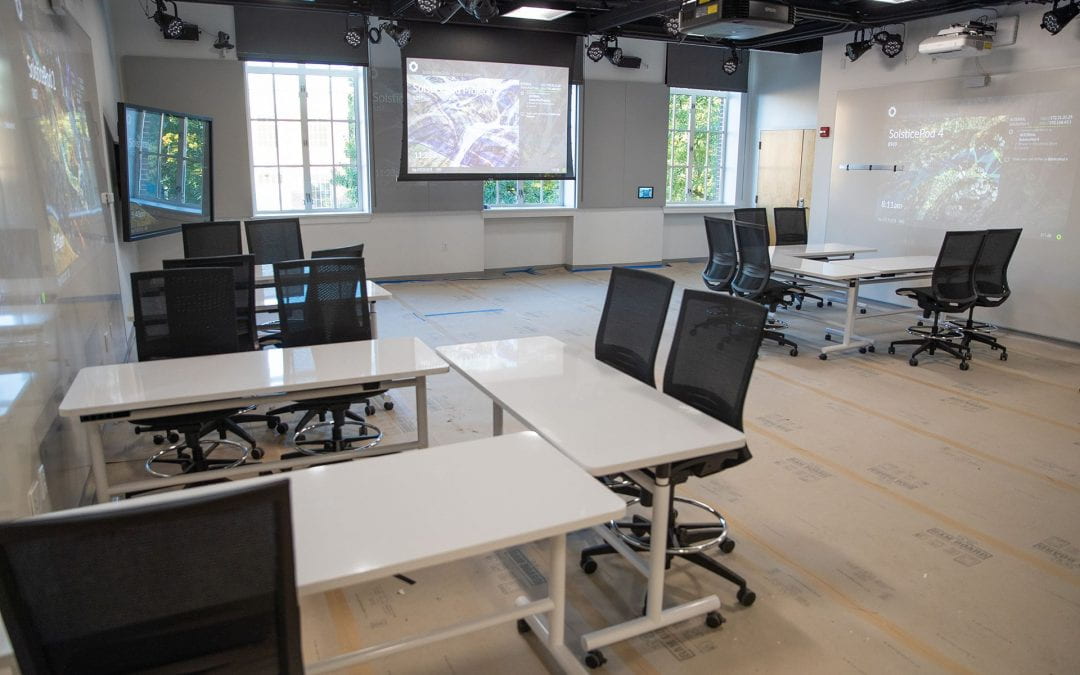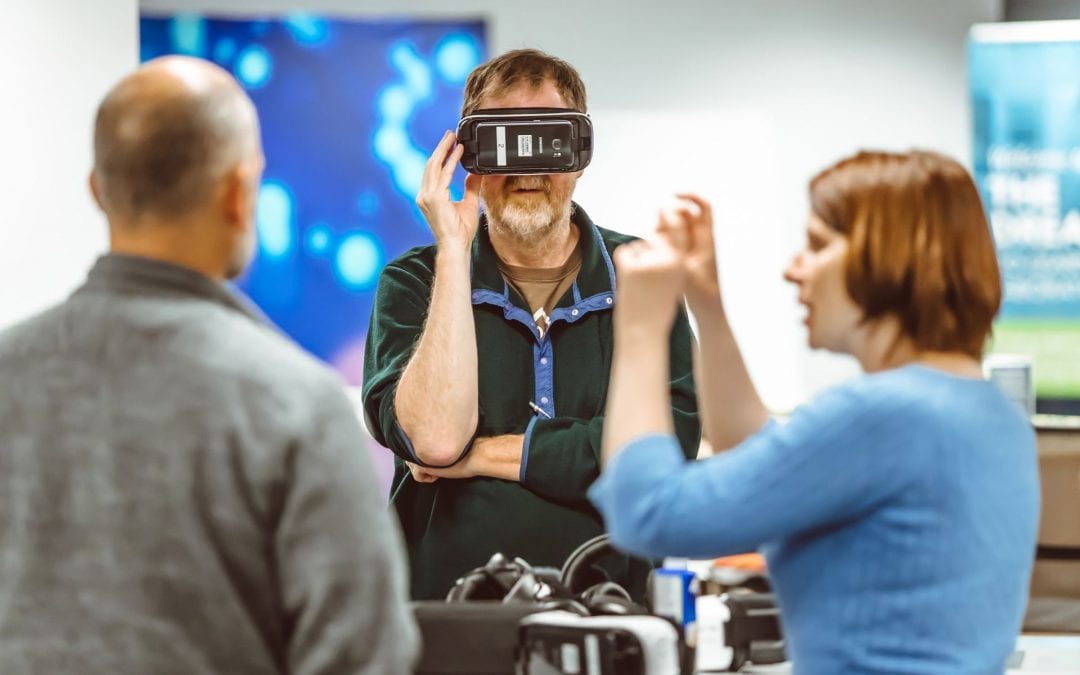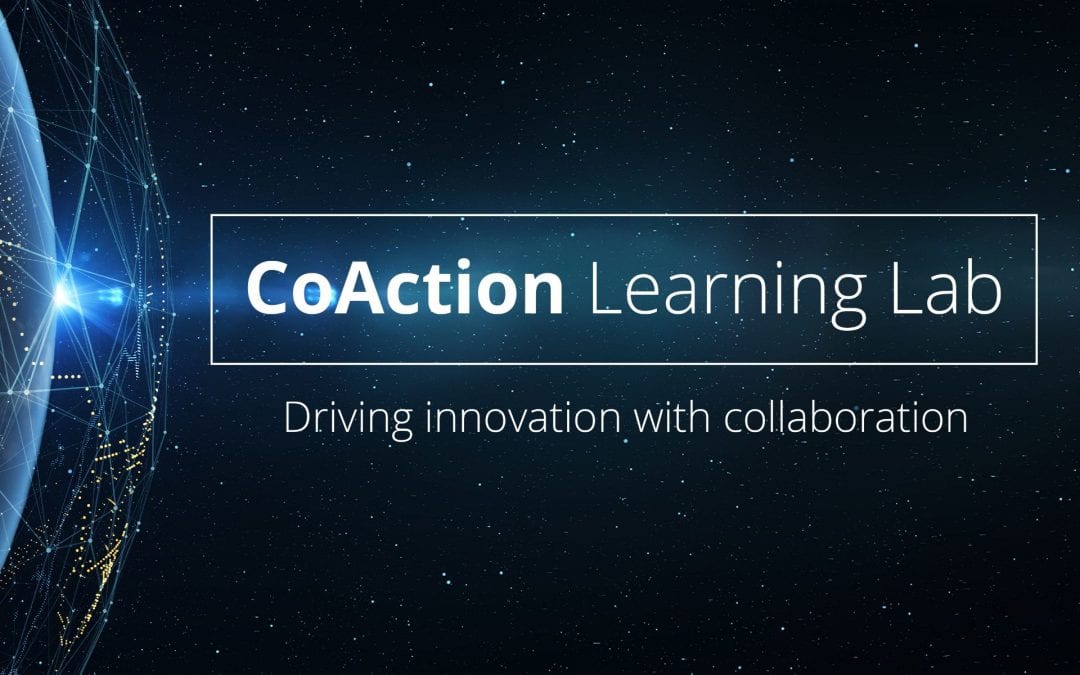
Oct 21, 2019 | Home Page
Penn State’s Center for Pedagogy in Arts and Design (C-PAD) and Teaching and Learning with Technology (TLT) invite the University community to explore its recently renovated experimental classroom in Borland 113. The open house will take place Monday, October 21 from 4:00 to 5:00 p.m.
The space is part of Penn State’s growing catalogue of active-learning, experimental rooms that research various teaching methods and how they impact learning. C-PAD’s new teaching lab is unique because it is designed specifically to support coursework related to design, visual arts, and performing arts.
Its features include; an observation room where pre-service teachers or other instructors can view classes in real-time; tailored technology such as theatrical lighting, surround sound, and an interactive display for sharing graphic designs; and flexible furniture like height-adjustable tables on wheels with writable, flip-top surfaces.
Penn State faculty are invited to attend the open house to learn more about the room’s features and what active-learning spaces, such as the teaching lab, are capable of accomplishing.
C-PAD is a partnership between the College of Arts and Architecture and TLT.

Dec 14, 2018 | Home Page
Effective teaching and learning methods are at the heart of what makes Penn State a leader in higher education. Those methods constantly evolve in an effort to match the rapid emergence of new technology that has the potential to transform education. Ideally, those evolutions will increasingly make a Penn State education more accessible and beneficial.
Teaching and Learning with Technology (TLT) annually provides a resource that allows University faculty to be at the forefront of investigating how new technologies can support innovative pedagogy. Faculty Learning Communities (FLCs) are open to tenure-track and teaching faculty at any Penn State campus, and each small cohort works together for a year toward a shared goal. Also, these groups can be formed cross-college, cross-campus, and/or cross-discipline.
Each FLC is created and led by a full-time Penn State faculty member with support coming from TLT. Leaders of these communities receive a $500 stipend and up to an additional $500 in funding to conduct lunches, tech tools sessions, guest speaker appearances, and other meetings with their FLC.
The group of FLC leaders for the 2018-19 academic year met a number of criteria in order to secure their roles. Along with enthusiasm for their topics, they were able to bring along at least three peers to participate in their FLC, collaborate with a TLT staff member on a kickoff meeting, schedule and facilitate regular meetings, and share their FLC’s outcomes at the TLT Symposium.
This year’s FLCs reach across Pennsylvania from Erie to Berks County and cover a broad range of topics from teaching data visualization to global learning in agriculture.
Here is the full list of 2018-19 Faculty Learning Communities at Penn State and their respective leaders:
FLC Leader Campus Topic
Benjamin Lear University Park Teaching of Data Visualizations
Dawn Pfeifer Reitz Berks Innovative Instructional Technologies in the Classroom
Heather Cole Erie Digital Fluency and Content Development
Lara LaDage Altoona Mentoring Undergraduate Student Researchers
Melanie Miller Foster &
Noel Habashy University Park Global Learning in Agriculture
Neyda Abreu DuBois Scholarship of Teaching and Learning in Chemistry
Beth Egan University Park Open Education Resources: Local & Global Appeal

Nov 6, 2018 | Home Page, Uncategorized
A worldwide collection of universities and colleges have joined together to explore technology’s potential to define the prospects of teaching and learning. With its debut, this collaboratory called the CoAction Learning Lab will create an online library of original and curated resources that will support higher education innovators.
“Emerging technology has outstanding potential to advance the vision of equal access, high-quality learning experiences, and continuous innovation in higher education,” said Michael Kubit, Penn State chief information officer. “By continuously exchanging ideas, the CoAction Learning Lab community expects to establish and grow resources that support meaningful ways to leverage emerging technology to advance teaching and learning.”
Penn State launched a call for community partners in April 2018, and a diverse group of 18 universities and colleges across four continents signed on to participate. Currently, the group is establishing a shared set of core values that can drive decision-making around how technology can support teaching, learning, and pedagogy in higher education.
The following institutions have representation in the CoAction Learning Lab:
- Penn State – leader and founding member
- Arizona State University
- Charles Sturt University, u!magine Digital Learning Innovation Laboratory
- Conestoga College
- California State University Channel Islands, Teaching & Learning Innovations
- Curtin University Learning Futures
- Full Sail University Media Communications & Full Sail Labs
- Ithaca College
- State University of New York (SUNY) System Administration
- Taylor’s University
- University at Buffalo
- University of Central Florida
- University of Connecticut Digital Media & Design
- University of Missouri
- University of Ottawa
- University of Plymouth
- University of Tennessee Libraries
- University of West Florida
- Western Governors University
Each community partner is represented by a team consisting of at least one technology leader, one learning facilitator, and one student. By including each of these voices, diverse perspectives from across higher education will shape the foundation of the online library.
Additionally, the public will have opportunities to provide feedback as the CoAction Learning Lab identifies its values and compiles a list of technologies that enable and support those values.
Ultimately, the library’s resources will be freely accessible online for the worldwide higher education community. The resources will support students, instructors, instructional designers, and technology leaders on issues like creating student-centered learning experiences, advancing effective digital pedagogies, and more. These resources will be available on the CoAction Learning Lab’s website.


